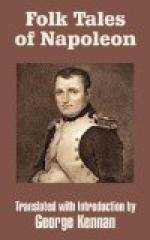Like Jesus Christ before his last agony, he believed himself deserted by God and his star; and in order that no one should see him conquered, it was his intention to die; but, although he took poison enough to kill a whole regiment, it never hurt him at all—another proof, you see, that he was more than man: he found himself immortal. As he felt sure of his business after that, and knew that he was to be Emperor always, he went to a certain island for a while, to study the natures of those people in Paris, who did not fail, of course, to do stupid things without end.
While he was standing guard down there, the Chinese and those animals on the coast of Africa—Moors and others, who are not at all easy to get along with—were so sure that he was something more than man that they respected his tent, and said that to touch it would be to offend God. So he reigned over the whole world, although those other fellows had sent him out of France.
Well, then, after a while he embarked again in the very same nut-shell of a boat that he had left Egypt in, passed right under the bows of the English vessels, and set foot once more in France. France acknowledged him; the sacred cuckoo flew from spire to spire; and all the people cried, “Long live the Emperor!”
In this vicinity the enthusiasm for the Wonder of the Ages was most hearty. Dauphiny behaved well; and it pleased me particularly to know that our own people here wept for joy when they saw again his gray coat.
On the 1st of March Napoleon landed, with two hundred men, to conquer the kingdom of France and Navarre; and on the 20th of the same month that kingdom became the French Empire. On that day the man was in Paris. He had made a clean sweep—had reconquered his dear France, and had brought all his old soldiers together again by saying only three words: “Here I am.” ’Twas the greatest miracle God had ever worked. Did ever a man, before him, take an empire by merely showing his hat? They thought that France was crushed, did they? Not a bit of it! At sight of the Eagle a national army sprang up, and we all marched to Waterloo. There the Guard perished, as if stricken down at a single blow. Napoleon, in despair, threw himself three times, at the head of his troops, on the enemy’s cannon, without being able to find death. The battle was lost.
That evening the Emperor called his old soldiers together, and, on the field wet with our blood, burned his eagles and his flags. The poor eagles, who had always been victorious, who had cried “Forward!” in all our battles, and who had flown over all Europe, were saved from the disgrace of falling into the hands of their enemies. All the treasure of England couldn’t buy the tail of one of them. They were no more!




